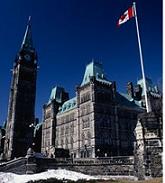Immigration System
Mexican president says visa requirement costing Canada
 Canada is losing hundreds of thousands of visitors from Mexico because of visa requirements imposed by the Harper government to curb refugee claims, Mexican President Felipe Calderon told the House of Commons on Thursday.
Canada is losing hundreds of thousands of visitors from Mexico because of visa requirements imposed by the Harper government to curb refugee claims, Mexican President Felipe Calderon told the House of Commons on Thursday.
In a speech that otherwise dwelt on his government's efforts to "transform" Mexico into a safer and more prosperous country, Mr. Calderon acknowledged that Mexicans had abused Canada's refugee system and said he respects Canada's right to determine its own immigration system. However, he expressed "regret" at the visa program and pledged to work with Canada "so that this temporary measure can be put behind us."
"My country recognizes the generous Canadian tradition of providing a refuge to those escaping persecution, discrimination or widespread violence," he said. "However, I also know that there have been some who, abusing the generosity of the Canadian people, have perverted the noble aims of the asylum system to their own ends, which led the Canadian government to require visas for those travelling between our countries."
He said there had been a 40%decline in Mexican visitors to Canada over the past year.
"We thoroughly respect Canada's right to make decisions regarding its immigration system," he said. "I cannot, however, fail to convey to you our regret at that series of incidents and those decisions. We sincerely hope that the solution that this Parliament is studying through comprehensive amendments to the refugee law will also serve as a bridge that will enable us to renew the exchanges of our visitors."
On the eve of Mr. Calderon's two-day visit to Ottawa, Toronto and Montreal, a Canadian government official said Prime Minister Stephen Harper and the Mexican president were expected to have a "pretty robust discussion" about Canada's 10-month-old visa requirements. The measure was introduced last July to cut "bogus refugee" claims and reduce spiralling costs and delays. Only one in 10 of the more than 9,400 refugee claims in Canada from Mexicans in 2008 was accepted.
Introducing Calderon, Harper said the visa program was no fault of the Calderon government. He praised Mr. Calderon as a leader who has "shown remarkable courage" in confronting the drug cartels in Mexico and had been a friend to Canada.
Earlier, MR. Calderon mingled with a group of people who had gathered to watch him and his wife Margarita Zavala at an outdoor ceremony where he laid a wreath at the tomb of the unknown soldier at the national war memorial across from Parliament Hill. He kissed at least a dozen women, shook hands and posed for photos.
There was only one protester in the crowd, a clownish fellow wearing a sombrero and a sign against Canadian seal hunting that said "Si to seals. Stop the slaughter."
Trade Minister Peter Van Loan last month introduced a fast-track visa process for specified Mexican business travellers, a step that Mexico's ambassador to Canada, Franciso Barrio-Terrazas, has said he hopes will be expanded to tourists and students.
Mr. Calderon arrived Wednesday night from a U.S. visit where drugs and U.S.-Mexico border controls were prominent issues.
In his speech to Parliament, he thanked the RCMP for training Mexican police commanders. "One of the most important transformations toward which we are working is the effort to uphold the rule of law in Mexico," he said. "That struggle is neither exclusively nor chiefly intended to halt drug trafficking. The primordial goal is to ensure peace and tranquility for Mexican families."
Mr. Harper and Mr. Calderon later signed a joint action plan on air transport co-operation, youth work exchanges and $4-million worth of programs to help Mexico strenghen its judicial system. "The initiatives signed today demonstrate that we are deepening our relations in a wide number of areas that will benefit both our peoples," Harper said in a written statement.
(Published by National Post – May 27, 2010)